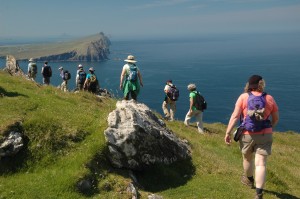
Would you take a walking tour in Ireland now — and tell your friends about it? Photo from Walking the World
As dedicated travelers, what are we to think of the concept of “travel shaming” — the notion that it’s irresponsible to travel or even plan future trips during a pandemic?
According to a recent New York Times article, people desperate to get out of their houses after months of self-quarantining are heading off on the road — but are traveling on the sly, reluctant to post pictures on social media or even to tell friends they’re leaving, for fear of being judged.
As the Times quoted Harvard Business School assistant professor, Jillian Jordan, who studies moral psychology: “The pandemic presents a unique case of travel entering the moral sphere, because there are two things that happen when you travel: The first is that I put myself at risk, and the second is by virtue of putting myself at risk, I could be spreading coronavirus to other people.”
Consequently, the Times piece notes, “Two-thirds of the nearly 4,000 Americans surveyed in June by Ketchum Travel, a public relations agency, said they would judge others for traveling before it’s considered ‘safe.’”
A Flight Guru’s Perspective
As a baby boomer whose age puts me in a high-risk category, I fully understand why traveling at this time raises serious — even life-threatening — concerns.

Arizona’s Grand Canyon offers plenty of open space for a safe getaway. Photo from the National Park Service.
In fact, I haven’t ventured beyond my home base, Tucson, in months. But I also understand why people choose to travel — assuming they’re taking all the necessary precautions.
Which leads me to one of the best discussions of travel shaming that I’ve come across.
It comes from Scott Keyes, the chief guru at Scott’s Cheap Flights, which I’ve previously recommended for landing the absolutely lowest airfares out there. (One that recently caught my eye was round-trip Philadelphia-Japan next Jan-Jun in the U.S.$200s).
While Scott has an obvious financial interest in convincing people that flying is (for the most part) safe, his perspective on the topic is well-balanced and informative. So I’ll turn the floor over to Scott:

 Travel Is Neither “Safe” nor “Unsafe.”
Travel Is Neither “Safe” nor “Unsafe.”
One reason why there’s such a debate about travel shaming is because the discussion often falls into a rhetorical trap about whether travel is safe or not.
As tempting as an either/or dichotomy is, the truth is much more complex. Travel is an amalgamation of behaviors, some of which are riskier than others. And personal precautions—wearing a mask is highly effective, as is avoiding unventilated areas as much as possible—can go a long way to mitigate that risk.
Yes, there are things people should absolutely not be doing and if they’re doing them, you can be pretty sure they’re putting themselves and others at risk.
If Mike travels to Austin and spends the trip in crowded bars and movie theaters—all without a mask—that’s far riskier than Alyssa’s family camping trip in Wyoming.
In many ways, it comes down to a question of trust. Most of us feel capable of taking our own trip in a way that minimizes risks (masks, outdoors, etc.); do we trust that others will take the same precautions?
 ️ Planes Aren’t Superspreaders
️ Planes Aren’t Superspreaders
Many people assume airplanes are superspreaders, given the close proximity to others and indoor setting. But that’s a mistake.
Because of hospital-grade air filters, on-board mask requirements, and constant fresh air getting sucked into the cabin, studies have found that airplane air is as clean or cleaner than the air in other indoor environments. (Plus, despite the occasional viral photo, most planes are still less than half full today.)
While there’s not a zero percent chance of getting sick on a plane, tens of millions have flown since the pandemic began and there’s been just one documented case of multiple people on a plane getting sick.
We assume that flying is an unmitigated risk, but there’s not a lot of evidence that’s the case. Wear a mask, wash your hands, and know that you’re not a terrible person if you get on an airplane.
 Talking Past One Another
Talking Past One Another
Even if we were all to agree about air quality in plane cabins and the importance of masks, many people are still personally uncomfortable with the idea of traveling, and will be for some time. That’s okay.
Those who are comfortable traveling right now shouldn’t accuse critics of wanting everyone to lock themselves at home until there’s a vaccine, nor should travel’s critics assume that travelers are taking no precautions. We’re all stressed out, and a bit of generosity towards one another can go a long way.
Take my 75-year-old parents. In 2019, they wouldn’t have had any hesitation about getting on a plane. Today, the opposite is true. Even after they get a vaccine, it may take a while before they’re comfortable flying again.
It may feel productive to castigate one another for being too cautious or not cautious enough, but shaming is often counterproductive because it leads to defensiveness, Notre Dame psychology Daniel Lapsley pointed out. “Being shamed does not change behavior and in fact may exacerbate it.”
 Are We Allowed to Have Nice Things During a Pandemic?
Are We Allowed to Have Nice Things During a Pandemic?
In many ways, this is the core question. If everyone stayed indoors and only left their home for essentials, the pandemic would be over much quicker. Given that most travel is discretionary, there’s a sense that it’s unethical to have fun in public when so many have had their lives upended.
On the other hand, we’re forward-looking creatures. Having plans for the future is vital for our sanity today. And while travel can seem indulgent amidst so many layoffs, spending money at small businesses and restaurants is their best hope for survival.
I’m certainly not advocating for irresponsible behavior. Whether traveling or otherwise, we should be politely encouraging one another to take responsible precautions.
Wear a mask, prioritize outdoor activities—a recent study found that COVID-19 transmission was 18.7 times higher indoors than outdoors—and avoid crowded areas wherever possible.
Before we cast shame on someone taking her family on a weekend getaway, ask yourself if she’s truly being irresponsible in her travels or if our objection is that it seems like she’s looking for joy during a dark time.
 There’s No Shame in Booking Travel Today
There’s No Shame in Booking Travel Today
By nature, flights are something you purchase in advance. Up to 12 months ahead of time. Many people are booking flights today not for this summer, but for next year when the pandemic will hopefully have significantly abated.
For a lot of people, myself included, having a trip to look forward to brings joy and excitement today—we all could certainly use more of that—even if the trip itself isn’t until next year.
And that’s doubly true if you’ve had to delay trips this year. I’m supposed to be in France right now. Being stuck at home instead, not great!
After a brief pity party, though, I reminded myself: Paris isn’t going anywhere. It’ll still be there next year. And when I’m finally able to make it there, it’ll be all the sweeter from anticipation.
So while making travel plans amid a pandemic may feel indulgent or discretionary, I wouldn’t overlook that people can do so in a way that’s both responsible and gives them anticipatory joy. A trip isn’t real until the flights are booked, after all.












2 Responses to 5 Reasons Why Travel Shaming Is Wrong